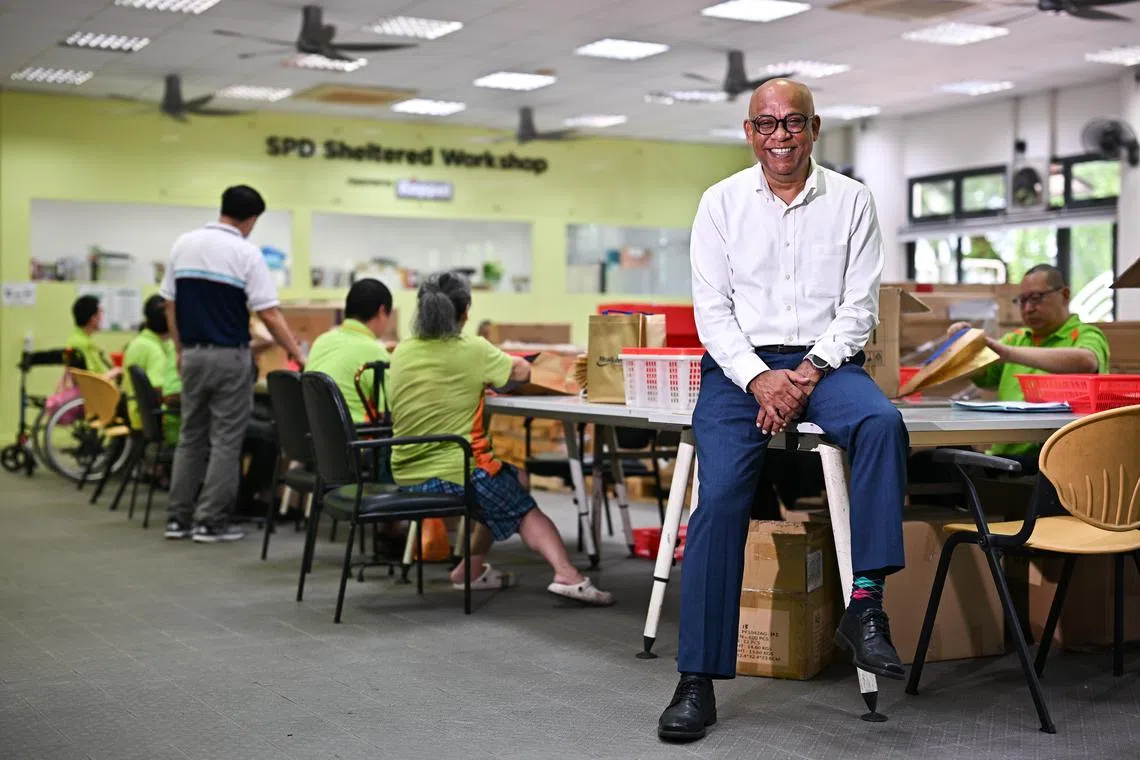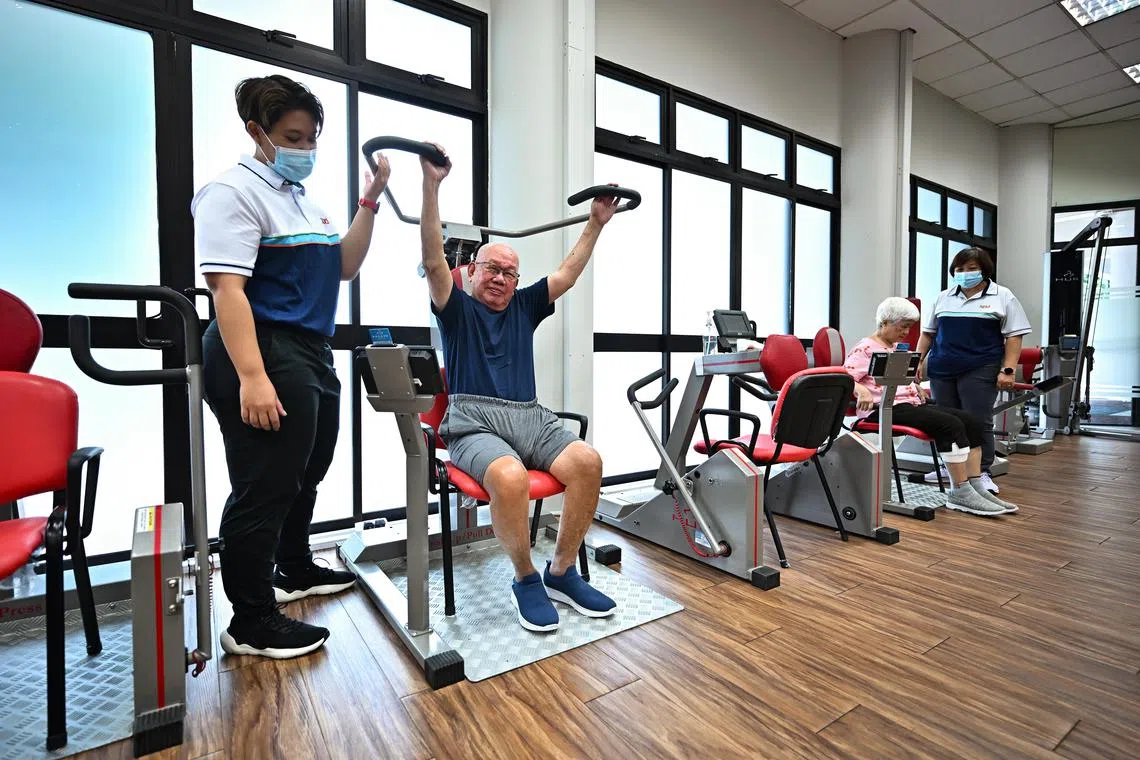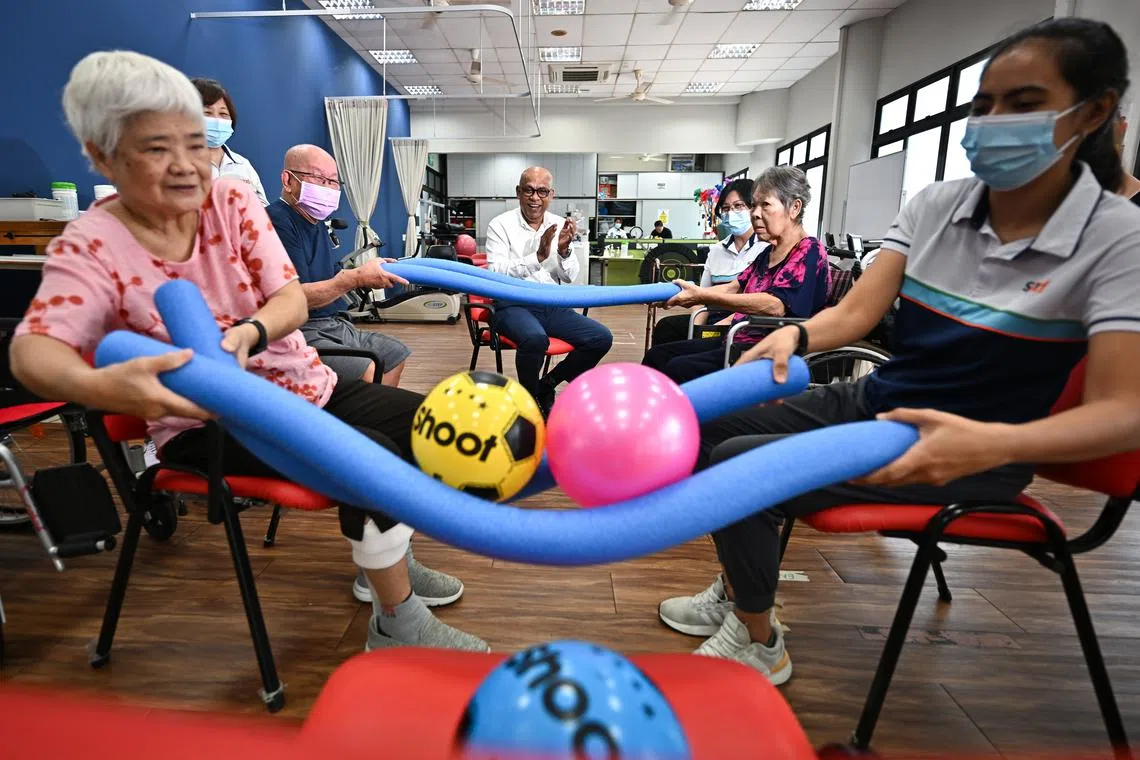Charity SPD marks 60th anniversary with 4 new centres to help those in need
Sign up now: Get ST's newsletters delivered to your inbox

SPD chief executive officer Abhimanyau Pal says the organisation faces challenges like changing client profiles and technological adoption.
ST PHOTO: LIM YAOHUI
SINGAPORE - For its 60th anniversary in 2024, SPD is launching four new centres to serve more needs.
The charity, which helps people with disabilities of all ages, launched a senior care centre in Canberra
In July, two early intervention centres in Kembangan and Jurong West will start operations to provide early intervention services for children with developmental needs.
It is a busy year, said SPD chief executive officer Abhimanyau Pal in an interview with The Straits Times on June 3 at the SPD Ability Centre in Tiong Bahru.
Founded in November 1964 by a group from the Rotary Club, SPD was known as the Society for Aid to the Paralysed and provided employment opportunities at its sheltered workshop to people with disabilities who had difficulties seeking open employment.
It was renamed Society for the Physically Disabled in May 1998 and later to just SPD in July 2014 to better reflect its service to people beyond physical disabilities.
Today, it serves people with physical, sensory and learning needs through more than 20 programmes encompassing early intervention, therapy, vocational training, assistive technology and daycare, as well as educational, employment and social service support. It has eight centres, including in Jurong East, Tampines and Toa Payoh.
SPD’s manpower resources had risen from 54 in the early 2000s to about 130 in 2009. It will grow to 500 employees by the end of 2024.
Mr Pal said: “While I used to see just grey or no hair in my conference room, I see more dark hair today as younger staff, including fresh graduates, join us.”
The 58-year-old, who has more than 25 years of experience in the healthcare and social service sectors, has helmed SPD since 2010.
SPD has three growth pillars. There is early intervention for young children, help for the post-18 to 55 group with education through scholarships and bursaries, and vocational training and employment. It has also been operating a therapy hub since 2005, working with other social and community partners to provide allied health services in the community.
According to the Enabling Masterplan 2030
More than 40 per cent of adults with disabilities (about 130,000 individuals) will be 65 years old or older in 2030. The Ministry of Health has also projected that one in two healthy Singaporeans aged 65 today could become severely disabled in their lifetime.
Every year, SPD has been serving more than 10,000 individuals with disabilities or who may develop disabling conditions.

SPD rehabilitation services therapy assistants supervising exercises at the SPD Headquarters on June 3.
ST PHOTO: LIM YAOHUI
Mr Pal listed some key challenges for SPD and the sector.
First, there has been a change in the clients’ profiles: While the number of those with physical disabilities has dipped, there are more with special needs such as autism and other developmental disabilities. SPD has to build up its capabilities to take care of the emerging needs, he said.
Those aged 55 and above who seek preventive services or early rehabilitation today have a very different social, economic and educational background from before. This next generation of service users are mostly middle-income, better-read, well-travelled and have specific requests.
“Before they come here, they have done a lot of research. So they ask questions like: ‘Why are you recommending this? I thought this alternative care is better,’” said Mr Pal.
The second challenge is technological adoption amid an ageing population and tight labour market.
“We have to think about how we, as a charity, can adopt technology while still prioritising the human touch,” said Mr Pal.
“At the same time, we also don’t want our staff to spend a lot of time on manual processes.”
Third, with the maturing of the Singapore economy where gross domestic product growth will just be incremental, SPD cannot be relying on just government funding but has to rally the support of corporations and individuals as well.
To reduce over-reliance on professional organisations, there is also a need to move from centre-based programmes to tap community resources and facilities such as community clubs and schools to provide service within the community.
“But this is not straightforward because our professionals are trained to provide service at the centres. You need a big shift in mindset to move to the community, which will not be easy,” said Mr Pal.
However, Singapore has become more inclusive, including through infrastructure such as wheelchair-accessible public buses and trains, and programmes for those aged 18 and below in special education and mainstream schools, he said.
There is still a need to increase options for those aged above 18, including daycare options, sheltered and supported employment, and employment in the open market, he added.

Every year, SPD has been serving over 10,000 individuals with disabilities or who may develop disabling conditions.
ST PHOTO: LIM YAOHUI
He lauded schemes that improve job opportunities for those with disabilities – such as the Open Door Programme
The employment rate of people with disabilities aged 15 to 64 stood at 30.1 per cent from 2020 to 2021. The masterplan aims to increase this to 40 per cent by 2030
“In the last 10 years, more companies are coming forward to ensure that inclusive hiring is happening,” said Mr Pal, adding that he is optimistic the target can be achieved.
But what keeps him awake at night are the sustainability of the organisation and attracting and retaining the right people.
When he entered the social service sector in the 1990s, it was drawing people who were passionate about the cause. Their focus was to serve, and not so much on the salary. However, he and a few colleagues advocated salary equity so that workers in the sector would be as fairly compensated as their peers in other industries. They have bread-and-butter concerns too, he said.
“We do not doubt the importance of salary, but there is a need to keep the passion to serve strong,” he said. “This is a balance we need to strike.”


